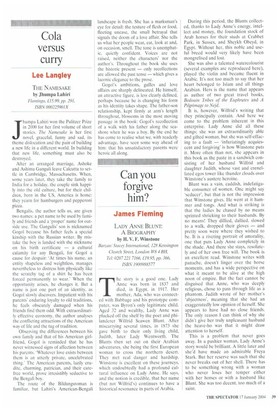Can you forgive him?
James Fleming
LADY ANNE BLUNT: A BIOGRAPHY by H. V. F. Winstone Barzani Stacey International, 128 Kensington Church Street, London W8 4 BH, Tel: 0207 221 7166, £19.95, pp. 366, ISBN 1900988577 The story is a good one. Lady Anne was born in 1837 and died, in Egypt, in 1917. Her mother, Ada, who was connected with Babbage and his prototype computer, was Byron's only legitimate child. Aged 32 and wealthy, Lady Anne was plucked off the shelf by the poet and philanderer Wilfrid Scawen Blunt. After miscarrying several times, in 1873 she gave birth to their only living child, Judith, later Lady Wentworth. The Blunts then set out on their Arabian adventures, she being the first European woman to cross the northern desert. They met real danger and hardship. Winstone is excellent on these journeys, which undoubtedly had a profound cultural influence on Lady Anne. He says, and the notion is credible, that her name (but not Wilfrid's) continues to have a historical resonance in parts of Arabia.
During this period, the Blunts collected, thanks to Lady Anne's energy, intellect and money, the foundation stock of Arab horses for their studs at Crabbet Park, in Sussex, and Sheykh Obeyd, in Egypt. Without her, this noble and useful breed would very likely have been mongrelised and lost.
She was also a talented watercolourist (several examples are reproduced here), played the violin and became fluent in Arabic. It's not too much to say that her heart belonged to Islam and all things Arabian. Hers is the name that appears as author of two great travel books, Bedouin Tribes of the Euphrates and A Pilgrimage to Nejd.
It is, however, Wilfrid's writing that they principally contain. And here we come to the problem inherent in this enterprise. Lady Anne did all these things: she was an extraordinarily able and gifted woman, but she was self-effacing to a fault — 'infuriatingly acquiescent and forgiving' is how Winstone puts it. More often than not, she appears in this book as the paste in a sandwich consisting of her husband Wilfrid and daughter Judith, whose vast and crenellated egos tower like thunder clouds over Winstone's austere heroine, Blunt was a vain, caddish, indefatigable consumer of women. One might say 'seducer', but that is not the impression that Winstone gives. He went at it hammer and tongs. And what is striking is that the ladies he chased by no means sprinted shrieking to their husbands. By no means? They dillied, dallied, slowed to a walk, dropped their gloves — and pretty soon were where they wished to be. It is a riveting portrait of amorality, one that puts Lady Anne completely in the shade. And there she stays, resolutely and of her own free will. The book is an excellent read. Winstone writes with panache, doesn't linger over the horse moments, and has a wide perspective on what it meant to be alive at the high noon of empire. But the fact cannot be disguised that Anne, who was deeply religious, chose to pass through life as a phantom. Judith wrote of her mother's 'abjectness', meaning that she had an exaggeratedly low opinion of herself, She appears to have had no close friends. The only reason I can think of why she didn't give her truly unpleasant husband the heave-ho was that it might draw attention to herself.
This is a problem that never goes away. In a pushier woman, Lady Anne's story would be brilliant. A little later and she'd have made an admirable Freya Stark. But her reserve was such that she never breaks out of her shell. There has to be something wrong with a woman who never loses her temper either with her horses or with a husband like Blunt. She was too decent, too much of a saint.


































































 Previous page
Previous page